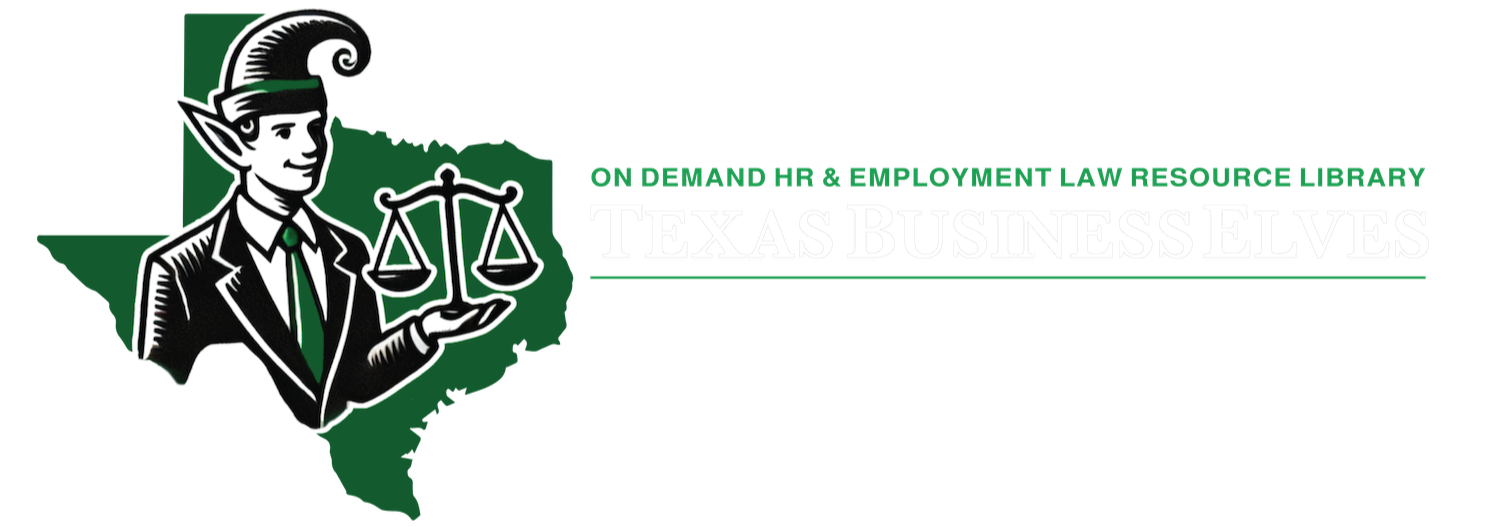
Texas Business ELVES Employment Law Dictionary
A Free Legal Dictionary for Employers, HR Professionals, & Workers
Direct Threat
Employer defense to a claim of disability discrimination whereby the employer proves that the employee posed a significant risk of substantial harm to the health or safety of himself or others that cannot be eliminated or reduced by way of a reasonable accommodation (i.e., the employee is a “direct threat”)…
Department of Labor (DOL)
Federal government agency tasked with interpreting and enforcing most federal laws that protect employees and set workplace standards except for federal laws prohibiting discrimination, harassment, and retaliation which are handled by the Equal Employment Opportunity Commission (EEOC) at the federal level…
Defamation
An intentional false statement of fact that causes injury to another person, or the act of making such a defamatory statement. The injury incurred through defamation is typically harm to the defamed individual’s reputation or standing in the community…
Decertification
The action of removing a labor union from its position as the representative of a bargaining unit. Decertification requires a vote by the bargaining unit employees, which is conducted by the federal National Labor Relations Board (NLRB)…
Credit Report
Collection of information about an individual’s payment history for certain debts, the type and number of debts and loans taken on by an individual (i.e., mortgage, auto loans, student loans), credit cards issued in the individual’s name, current and former residence addresses, bankruptcy filings, lawsuits involving the individual as a party, and criminal records…
Covenant Not to Compete
More commonly referred to as a “non-compete” or “non-competition agreement,” such a covenant is a contract whereby the employee agrees not to work for a competitor of the employer or start a competing business against the employer for a specified period of time after employment ends…
Course and Scope of Employment
The hours and circumstances of an employee’s job, commonly determined by the range of activities or actions an employee could reasonably be expected to perform as part of that job…
Continuing Violation
An unlawful employment practice that is ongoing rather than occurring at a specific point in time. An individual who is subjected to a continuing violation may be able to pursue relief for actions that would otherwise be outside the applicable limitations period for a Charge or lawsuit…
Consumer Reporting Agency
An individual or entity that regularly provides consumer reports - as defined by the federal Fair Credit Reporting Act (FCRA) - to third parties…
Consumer Report
Defined by the federal Fair Credit Reporting Act (FCRA) as any written or oral communication of information about an employee’s or job applicant’s (1) creditworthiness, (2) credit standing, (3) credit capacity, (4) general reputation, (5) personal characteristics, or (6) lifestyle…
Constructive Discharge
Legal theory whereby an employee who voluntarily terminates employment may still bring a claim for unlawful termination because the employer created or permitted work conditions so intolerable that a reasonable person in the employee’s situation would have felt compelled to voluntarily terminate employment…
Consolidated Omnibus Budget Reconciliation Act (COBRA)
Federal statute allowing employees and their families to continue receiving health care coverage under an employer’s group health care plan even after an event that would ordinarily terminate such coverage, such as a termination, layoff, reduction in hours, or divorce…
Compensation
All payment an employee receives for performing work, which can include wages in the form of hourly pay or a salary, overtime pay, bonuses, commissions, employee benefits, and job perquisites (“perks”), among other items.
Company Union
Group that appears to independently represent employees in their dealings with the employer but which is actually controlled by the employer…
Collective Bargaining Agreement (CBA)
Contract reached through collective bargaining negotiations between an employer and a labor union. CBAs typically address such items as wages, hours, benefits, grievance procedures, selection procedures (for promotions, layoffs, etc.), and other terms and conditions of employment…
Collective Bargaining
Negotiation process between an employer and a labor union on behalf of the represented bargaining unit to develop an agreement that will govern the terms and conditions of employment for the members of the bargaining unit…
Closed Shop
Employer that has agreed with a labor union to hire only union members and to require union membership as a condition of employment…
Class Action
Lawsuit in which a large group of individuals with similar legal claims join together as a “class” to sue the same defendant(s) over the same legal issue(s)…
Civil Rights Act of 1991
Federal law passed in response to numerous United States Supreme Court employment discrimination decisions to essentially overturn them as incorrectly limiting the reach of Title VII of the Civil Rights Act of 1964 (Title VII)…





















